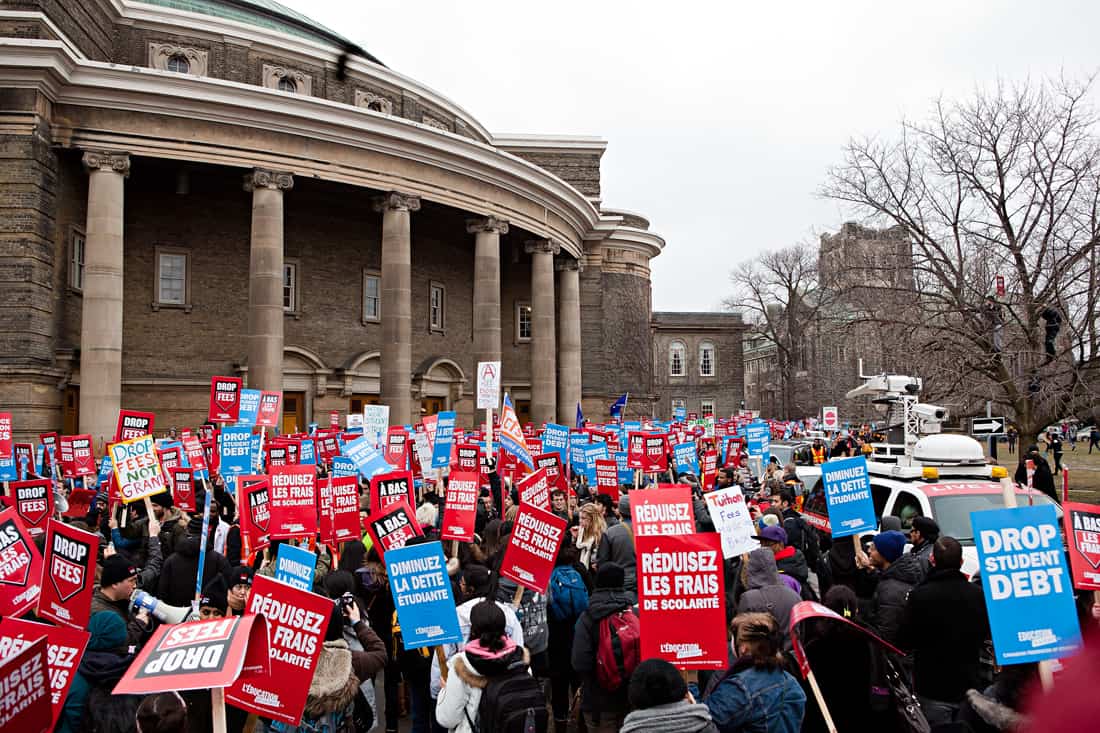This Tuesday, downtown Toronto will see the latest in a series of marches organized by provincial student associations in solidarity with student protestors in Quebec.
The march, which follows a similar event that drew 1,500 people Wednesday, represents the culmination of efforts by student associations including the Canadian Federation of Students-Ontario (CFS-O) to import the “Maple Spring” movement from Quebec. Tuesday’s march is being organized by the Ontario Students’ Mobilization Coalition, a combination of student associations, labour unions, faculty groups, and community activists
The CFS-O has long highlighted issues like tuition costs through annual days of action, but organizations in Quebec have seemingly succeeded in provoking a province-wide debate about the issue this summer.
Plenty to protest
Sandy Hudson, chair of CFS-O, says students from across the province are trying to determine the best way to bring a solidarity movement to Ontario.
According to one Facebook event, more than 50 separate marches known as “casseroles” (or pots and pans protests) are being planned nationwide.
Hudson says that students in Ontario have plenty to protest, from rising tuition fees that have outpaced inflation to become the highest in Canada, to declining government contributions towards post-secondary education.
Hudson also alleges that the McGuinty government broke a major election promise to reduce all undergraduate tuition fees by 30 per cent, and “then cut several grant and financial aid programs, including the Queen Elizabeth II Aiming for the Top Scholarship, the Textbook and Technology grant, and the Work Study program. Many students ineligible for the Tuition Grant would have been eligible for these programs.”
Another way forward
Jonathan Scott, president of the University of Toronto Young Liberals, defended McGuinty’s record on post-secondary education, crediting the Ontario government with “the most progressive student rebate in recent history,” and saying, “if we’re protesting getting $800 off, then we must have amnesia.”
Scott argues that the CFS “makes noise and claims credit” while much of the work reducing tuition is actually done by groups such as the Ontario Undergraduate Student Alliance (OUSA).
Sean Madden, a past president of OUSA, also encouraged potential protesters to consider other methods.
“Many people in the government, and those in opposition, have spoken to the value of our approach, [and] we feel that we offer pragmatic and well-thought-out public policy solutions,” said Madden.
Public protests such as the June 5 march work under a broad social mandate, Madden explained. Tuesday’s protest, for instance, has been billed as a general critique of the “neoliberal agenda.” Madden says the OUSA’s approach is to lobby the government directly, relying on research and dialogue.
More casseroles, or less?
U of T student and Huffington Post contributor Daniel Portoraro said the Quebec student protests should not be imported into Ontario, suggesting that “solidarity” does not guarantee change.
“Simply put, it would be a waste of time, both for the students and faculty members.” said Portoraro. “This issue does not demand more casseroles, it demands more conscious debate.
“Tuition hikes in Quebec are necessary in order to be able to offer students a world-class education.”
However, UTSU president Shaun Shepherd insists that high quality education and tuition hikes do not necessarily go together.
“Students are paying more while the quality of education stagnates,” said Shepherd. The quality of our academic institutions derive from an array of factors independent of financial commitments.”
Support for Quebec movement not new
It remains unclear whether the organizers of Tuesday’s march will succeed in their mission to bring the protests and strikes to Ontario. But since Quebec students took the plunge earlier this summer, student associations, including some at the University of Toronto, have been vocally — and financially — supportive of the movement.
CUPE 3902, a union that includes U of T teaching assistants, donated $20,000 in April to CLASSE, one of three striking student associations in Quebec and widely regarded as the most hardline negotiator. Some union members have been flying and bussing to Montreal to join rallies there. And this past weekend, the Canadian Federation of Students (CFS) annual general meeting featured keynote addresses from organizers with striking Quebecois student organizations.
A petition circulated online calling for an Ontario-wide strike vote in the fall has so far collected hundreds of signatures, many from the York Federation of Students.
But some student leaders and protest supporters are not optimistic, off the record, about the prospect of a possible Ontario strike vote in the fall, saying the organizational infrastructure that enabled the protests in Quebec — a chain of general assembly-like bodies at the university-departmental level — does not yet exist in Ontario.
“My motivation for signing the petition was my belief in the momentum and enthusiasm of Quebec students,” said Dylan Chauvin-Smith, a second-year English student at U of T. “Finally, a real example that could rile Ontario’s apathetic youth population into action.”


